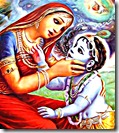 “Upon hearing this from Krishna's playmates, mother Yashoda, who was always full of anxiety over Krishna's welfare, picked Krishna up with her hands to look into His mouth and chastise Him. Her eyes fearful, she spoke to her son as follows.” (Shrimad Bhagavatam, 10.8.33) “Upon hearing this from Krishna's playmates, mother Yashoda, who was always full of anxiety over Krishna's welfare, picked Krishna up with her hands to look into His mouth and chastise Him. Her eyes fearful, she spoke to her son as follows.” (Shrimad Bhagavatam, 10.8.33)
The good mother has one primary duty: to see to it that her child is protected. The child doesn’t have any other protector in the early years. The father is likely out all day earning a living, and the mother is better suited to provide the care anyway. She nurtured the embryo and carried it to term in her womb for nine months, so what does anyone else really know about her child? She is the first caregiver, so she is ideally suited to look after her child in the early years, when they first start the discovery process in their new world.
It is in this area that the child can run into trouble. So many new things have to be discovered. The parent already knows about these things from their own discovery that they likely started many years back. Indeed, given the length and breadth of the material creation and the limited abilities of the conditioned, fallible living entity, it is impossible to know everything at any one point in time. Even if you were to gather every piece of information and feed it into your brain, you wouldn’t be able to recall everything at a moment’s notice.
If, in a relational database management system, you have your database tables aligned properly and the right indexes on the columns necessary for the lookup of data, you still can have some latency when running your queries. You need to tweak the text of your query so that the command can access the right columns and the proper indexes maintained on the system. Nevertheless, in a large system there are so many other factors to consider, such as concurrency, hardware limitations, and the constant addition of new data. This makes data retrieval an unpredictable process.
 If you were to retrieve all of the data in the system in a single request, your client application would have a difficult time handling such an overload of information. The data is placed into a database for a reason; the records are meant to be accessed individually per each instance of an entity, at least in a typical transactional application anyway. In the cases where you need aggregate data, still only a subsection is accessed by the client, namely the summary information. If you were to retrieve all of the data in the system in a single request, your client application would have a difficult time handling such an overload of information. The data is placed into a database for a reason; the records are meant to be accessed individually per each instance of an entity, at least in a typical transactional application anyway. In the cases where you need aggregate data, still only a subsection is accessed by the client, namely the summary information.
This is one way to understand the difficulty the human being faces with respect to trying to remember all the information they have discovered throughout their lifetime. The other issue is trying to make light of that information after it is retrieved. We may have run millions of experiments within a specific field of science, but we then need to know what to take away from the results. Are there any discoverable patterns? Has anything new been learned that can then be used in subsequent tests? Or better yet, have we learned a new way to alter our behavior for the better?
This is all too much to deal with for the new child, who can’t even do something as simple as walk. Eating is another major chore, for they need to know what to eat, how often, and from what sources. A long time ago, a particularly enchanting child in the spiritually infused town of Vrindavana was accused of having eaten dirt. This was not a good thing, for earth is meant to act as a container or a foundation. The earth suffers so much from the movements of other living entities. In the Vedic tradition, the earth is considered to be the most forgiving, as though it suffers earthquakes every now and then, it remains tolerant of the many kinds of impact it absorbs.
The earth is assigned its role by the higher authorities, and it can serve a variety of smaller functions within that role. Sadly, consumption as food is not one of them. Earth can be used to make pots, to act as roads, and to grow crops, but its substance is not considered edible. But the young child that is just discovering all that life has to offer has no idea about this. Therefore there is every chance that they can take a fistful of dirt in their hand and then drop it into their mouth.
 The fist in question was the most charming in the world. It had previously been used to give money to a fruit vendor who had visited the home. The parents, Nanda Maharaja and mother Yashoda, used to purchase fruit from a vendor by giving grains in return; the grains were thus a type of currency. The paper notes of today are supposed to represent an equal amount of a specific commodity held within the treasury of the government. Currency can represent pretty much anything, as in days past even cigarettes have been used as a means of exchange. In a future time, that same delightful fist would help in ridding the world of an evil king who had previously killed seven of this child’s older siblings. The fist in question was the most charming in the world. It had previously been used to give money to a fruit vendor who had visited the home. The parents, Nanda Maharaja and mother Yashoda, used to purchase fruit from a vendor by giving grains in return; the grains were thus a type of currency. The paper notes of today are supposed to represent an equal amount of a specific commodity held within the treasury of the government. Currency can represent pretty much anything, as in days past even cigarettes have been used as a means of exchange. In a future time, that same delightful fist would help in ridding the world of an evil king who had previously killed seven of this child’s older siblings.
The focus on this occasion was the wellbeing of the child. The friends and elder brother made the accusation to mother Yashoda that her son Krishna had eaten earth. The children used to play out in the fields during the daytime, and Krishna was the center of their universe. Wherever He went, they followed. If there was trouble, Krishna would save them. At the same time, if they wanted to have fun, they would play with Krishna and also eat lunch with Him.
Krishna was their leader, so He wasn’t always keen on listening to others. The children knew that if He ate dirt, or if at least He would be accused of doing the same, they could take the matter up with Yashoda, who had previously tied Krishna to a mortar after He had done something bad, when that charming little fist broke a pot of butter in anger and then dipped into that spilled supply. That fist then held the butter made from the sweet milk of Nanda Maharaja’s special cows and enjoyed it.
 As if to go to the complete opposite end of the spectrum, that same fist had now purportedly been used to eat dirt. Ah, what was Yashoda to do with her naughty son? Previously He went into the homes of the neighbors to steal their butter. He also broke the pot of butter in her home out of anger. Now He was accused of eating dirt. Yashoda took the matter very seriously. She picked up her young son and was ready to look into His mouth. Never mind that looking into someone else’s mouth is not something you look forward to. Just thinking of someone else’s mouth while they are eating is unpleasant enough, but for the caring mother the only concern was the safety of her child. If He was eating dirt, He needed to be reprimanded. If not, an explanation for the accusation needed to be forthcoming. Why should He make His mother worry so much all the time? As if to go to the complete opposite end of the spectrum, that same fist had now purportedly been used to eat dirt. Ah, what was Yashoda to do with her naughty son? Previously He went into the homes of the neighbors to steal their butter. He also broke the pot of butter in her home out of anger. Now He was accused of eating dirt. Yashoda took the matter very seriously. She picked up her young son and was ready to look into His mouth. Never mind that looking into someone else’s mouth is not something you look forward to. Just thinking of someone else’s mouth while they are eating is unpleasant enough, but for the caring mother the only concern was the safety of her child. If He was eating dirt, He needed to be reprimanded. If not, an explanation for the accusation needed to be forthcoming. Why should He make His mother worry so much all the time?
Oh, but that sweetheart of Vrindavana with the delightful fists had a larger objective in mind. He has been mesmerizing the world since the beginning of time. He has also delighted the devoteeswith transcendental affection that only strengthens during times of concern. Yashoda’s motherly affection increased every time Krishna apparently did something bad, and on this occasion she was lured into the pleasant trap of seeing the universal form, the entire creation within the blessed child’s mouth.
Yogis, mental speculators, and fruitive workers alike have tried their hardest to envision that universal form, to see the entire creation in a single glance. That vision gives evidence to the fact that there is a God, that there is a meaning behind this complex thing we call life. In reality, that vision is only the beginning point, an insignificant reward that just hints at the Supreme Controller’s true potency. The higher benefit is getting the chance to love that darling of Vrindavana, to show Him unlimited affection, day after day. The sincere souls devoted to the Supreme Personality of Godhead pray to have that devotion in life after life, and just as He delighted mother Yashoda with His pastimes, the charming butter thief of Vrindavana grants their wishes accordingly.
In Closing:
On the earth children are known to sometimes play,
Roll on the ground but never should they think of eating clay.
Against her son Krishna was this accusation made,
New worry for mother who always for God’s protection prayed.
Stealing butter, breaking pots, Krishna always mischievous,
But eating dirt was a matter to take very serious.
In her caring arms her son she took,
So that in His mouth she could have a look.
More than dirt to be found, everything seen instead,
To the vision of universal form her son led.
 |
Search This Blog
Showing posts with label Krishna's Mercy. Show all posts
Showing posts with label Krishna's Mercy. Show all posts
Saturday, June 16, 2012
Time For Panic
Friday, June 15, 2012
Friends of the Demigods
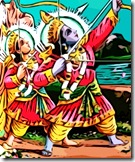 “These two are the sons of King Dasharatha, are jewels of their family line, are named Rama and Lakshmana, and are here to vanquish the enemies of the demigods.” (Janaki Mangala, 47) “These two are the sons of King Dasharatha, are jewels of their family line, are named Rama and Lakshmana, and are here to vanquish the enemies of the demigods.” (Janaki Mangala, 47)
pūṣana baṃsa bibhūṣana dasaratha nandana |
nāma rāma arū lakhana surāri nikandana ||
The enemies of the saintly class are tagged as demons in the Vedic tradition. There has been a constant clash between the forces of good and the forces of evil since time immemorial. The good want to follow the dictates of the Supreme Personality of Godhead, whereas the miscreants want to disobey every legitimate law code ever instituted. In a localized area, defiance of the established rules perhaps doesn’t amount to much of a negative consequence, but in the larger scheme the influence of demonic behavior can be quite strong. The most lasting influence is the effect had on thwarting God consciousness, which is the ultimate aim for every living being.
“How can we say that any specific aim is universally ideal? Isn’t everyone different? We are born into different circumstances, have different inherent characteristics, and thus develop varieties in tendencies. Therefore what is good for one person may not be for another.” But when it comes to law codes, especially those instituted by the higher authorities, there is no need for attention to variety. For instance, the red light in the traffic intersection applies to all travellers on the road, not just those who feel like getting to their intended destination. One side of traffic is stopped by the red light, but the restriction is in place to prevent an accident for everyone, as the traffic crossing on the other side is provided the right of way. Once they get a red light, the other traffic that was previously stopped is allowed to continue.
 The laws of God can be likened to a set of instructions meant to allow every person to direct their natural tendency in action to the proper channels. The “good” therefore at least pay deference to these laws, though they may not understand the purpose to them. As the material world operates on duality, not everyone is forced to abide by the laws guiding conduct. Just as in our smaller communities the lawbreakers are punished with sentence to jail, in the larger scheme those who violate the laws of God are punished through nature’s influence. Birth itself is a punishment, as accompanying it is death. Whatever you accept in life, you must eventually renounce later on. How can such a ride ever be considered a pleasurable experience? The laws of God can be likened to a set of instructions meant to allow every person to direct their natural tendency in action to the proper channels. The “good” therefore at least pay deference to these laws, though they may not understand the purpose to them. As the material world operates on duality, not everyone is forced to abide by the laws guiding conduct. Just as in our smaller communities the lawbreakers are punished with sentence to jail, in the larger scheme those who violate the laws of God are punished through nature’s influence. Birth itself is a punishment, as accompanying it is death. Whatever you accept in life, you must eventually renounce later on. How can such a ride ever be considered a pleasurable experience?
The conduct of the lawbreakers is another punishing aspect of birth in the material world. The person who runs the red light not only puts their own life in jeopardy, but they also cause damage and pain to those who had faith in the ability of the stoplights to prevent other traffic from entering the intersection at the wrong time. In this way the pious turn out to be innocent and victims of the misjudgments of the impious. Therefore the governing bodies must be unflinching and impartial in their administration of justice. The lawbreakers should have the fear of punishment within them, for otherwise the pious will have to live without trusting anyone.
During the Treta Yuga, the saintly class was concentrated in the forests, where they found peace and quiet. The priests who were devoted to God and understanding Him sought shelter in the holy name and austerity and penance. The devotees are referred to as suras in Sanskrit, and their counterparts are the asuras. “Ari” refers to enemies, so the worst miscreants are known as surari. The king is generally responsible for protecting the suras residing on earth, and in the heavenly realm the Supreme Lord Himself is petitioned for help to defend against the attacks of the most powerful suraris, or the asuras.
 Whenever there is a decline in religious practice and a predominant rise of irreligion, the Supreme Personality of Godhead personally descends to earth. In the Treta Yuga, He appeared as Lord Rama, the eldest son of King Dasharatha. A partial expansion of the Supreme Lord Vishnu appeared as Rama’s younger brother named Lakshmana. These two youths were jewels of the Raghu-vamsha, the dynasty of King Raghu. Because of their family relation to the famous king, both Rama and Lakshmana were often addressed as Raghava. Whenever there is a decline in religious practice and a predominant rise of irreligion, the Supreme Personality of Godhead personally descends to earth. In the Treta Yuga, He appeared as Lord Rama, the eldest son of King Dasharatha. A partial expansion of the Supreme Lord Vishnu appeared as Rama’s younger brother named Lakshmana. These two youths were jewels of the Raghu-vamsha, the dynasty of King Raghu. Because of their family relation to the famous king, both Rama and Lakshmana were often addressed as Raghava.
Aside from their divine beauty, the brothers were expert bow-warriors, capable of defending the suras from attack. Rama and Lakshmana’s position with respect to this defense was explained to King Janaka, who hosted a famous ceremony one time. The king’s daughter, Sita Devi, was going to marry whoever could lift the extremely heavy bow handed down to Janaka from Lord Shiva. Rama and Lakshmana weren’t specifically there to take part in the contest, for they were away from home when the news went out. They were escorting Vishvamitra Muni in the forests, protecting him from the attacks of the Rakshasas, the night-rangers who were the greatest enemies of the suras on earth.
The demigods were in great distress due to the influence of the leader of the suraris, Ravana. In order for Ravana to be defeated, a human being needed to fight him. Since no ordinary human being had the prowess necessary to defeat Ravana, God Himself appeared on earth in the guise of a human. Since Rama was part of the Raghu-vamsha, He made dedication to the governing law codes His way of life. Because of this deference to dharma, Rama needed an outward excuse to take on Ravana in battle. That excuse would come through Sita.
It was not uncommon for kings to fight openly with other kings and then take the defeated king’s princesses as a reward. In this sense Ravana’s desire to have Sita was not out of the ordinary, but since he knew that Rama couldn’t be beat, he set up a ruse whereby he was able to steal Sita in secret. This took place after Rama lifted Shiva’s bow and won Sita’s hand in marriage. Therefore the meeting between Vishvamitra and Janaka was very important.
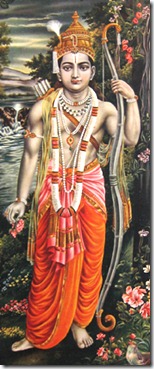 In the above referenced verse from the Janaki Mangala, we get some details of that meeting. Janaka couldn’t believe how beautiful Rama and Lakshmana were. They looked like they weren’t from this world, and in this regard Janaka’s intuition was correct. Vishvamitra informed the king that the two boys were ready to defend the suras from the attacks of the demons. If we know that a powerful figure is there to protect us from the worst kind of miscreants, we are a little comforted. Despite their powerful influence, the Rakshasas could not defeat Rama and Lakshmana, who would rid the earth of Ravana and his reign of terror. In the above referenced verse from the Janaki Mangala, we get some details of that meeting. Janaka couldn’t believe how beautiful Rama and Lakshmana were. They looked like they weren’t from this world, and in this regard Janaka’s intuition was correct. Vishvamitra informed the king that the two boys were ready to defend the suras from the attacks of the demons. If we know that a powerful figure is there to protect us from the worst kind of miscreants, we are a little comforted. Despite their powerful influence, the Rakshasas could not defeat Rama and Lakshmana, who would rid the earth of Ravana and his reign of terror.
Of course there are more than just the stated enemies of the saints to contend with. The material land is conducive to lethargy, impiety and general deviation from the righteous principles. Maintaining a high ethical standing with respect to general moral principles is difficult, and it’s even more difficult to follow the righteous path aimed at fostering God consciousness, which is the ultimate aim for every spirit soul. We may have different external conditions and attributes, but deep down every living entity is a spirit soul, part and parcel of God. The religious principles espoused by the saints are meant to bring the most favorable end for every single person, regardless of what they may or may not know about God.
If you think that God is formless and just an impersonal energy named Brahman, you can follow the brahminical principles of austerity, truthfulness, mercy and cleanliness for advancement. If you think that God is just material nature meant to be enjoyed by the senses, follow the recommended sacrifices and rituals in fruitive activity to reach a higher end. If you think that God exists within the heart to be used for attaining terrific abilities, do meditational yoga and see the lasting benefits.
If you are fortunate enough to know God’s true position as Bhagavan, the Supreme Personality of Godhead, regularly recite His names in a mood of love: “Hare Krishna Hare Krishna, Krishna Krishna, Hare Hare, Hare Rama Hare Rama, Rama Rama, Hare Hare”. Think of Him always, remember His activities, and keep in mind His peerless vision. Just regularly hearing Vishvamitra’s words describing the attributes of Rama and Lakshmana fulfills the mission of life, of connecting with God and staying by His side.
Indeed, the purpose of every ritual and regulation, of every law code instituted and protected by the suras, is to taste the sweetness of the association of the Personality of Godhead. There is variety in this interaction, as Bhagavan is Shri Krishna, the two-handed youth who holds a flute in His hands and wears a peacock feather in His hair. Krishna is the delight of the Yadu dynasty, and He too protects the suras from their enemies. He offers protection through both His physical action and His pearls of wisdom presented in the Vedic texts like the Bhagavad-gita.
Regardless of your worshipable figure of choice - Krishna, Vishnu, Rama, or the generic God - the aim of life is to connect with the Supreme Lord, knowing that His protection is flawless. That protection’s existence is proven by the ability to think of Him, to rely on His names, forms and attributes to get us through difficult times, where the enemies of the devotees try to assert their influence. The weight of Lord Shiva’s bow was no match for Rama, and the same went for the attacks of the night-rangers. Rama and Lakshmana saved the day many thousands of years ago, and their names continue to rescue the fallen souls today.
In Closing:
“Of King Dasharatha these sons are a delight,
Jewels of Raghu’s clan, enemies of saints they fight.
With their arrows the demons they will vanquish,
So that saints their daily trepidation can relinquish.”
With Vishvamitra to Janakpur they go,
So that Rama can lift Lord Shiva’s bow.
For everyone’s benefit are made the rules,
Pious path to help both the intelligent and the fools.
But must be punished the breakers of the law,
Otherwise no safety, system to exist with flaws.
Rama and Lakshmana thus to saints are friends,
Worthy punishment to their enemies they send.
 |
Tuesday, June 12, 2012
Creating Trouble
 “First a complaint was lodged with mother Yashoda about Krishna's stealing, but mother Yashoda did not chastise Him. Now, in an attempt to awaken mother Yashoda's anger so that she would chastise Krishna, another complaint was invented-that Krishna had eaten earth.” (Shrila Prabhupada, Shrimad Bhagavatam, 10.8.32 Purport)
“First a complaint was lodged with mother Yashoda about Krishna's stealing, but mother Yashoda did not chastise Him. Now, in an attempt to awaken mother Yashoda's anger so that she would chastise Krishna, another complaint was invented-that Krishna had eaten earth.” (Shrila Prabhupada, Shrimad Bhagavatam, 10.8.32 Purport)
If a dependent does something which is against the rules, which is forbidden for them, the caretaker has to stop what they are doing and give attention. When the rules are being followed without a problem, where is the cause for concern? When will the opportunity come for correcting the mistakes of the dependent? Knowing full well this need within the loving caretakers, the Supreme Personality of Godhead creates situations where that love can be offered. In Vrindavana a long time ago, He occasionally broke the rules on purpose to grab the attention of loving caretakers like His mother. And even when He might have been innocent, just the thought that He might have done something wrong resulted in the same affectionate attention from His mother.
What sorts of things would Krishna do? One time, His friends lodged a complaint that He had eaten dirt. Dirt, or earth, can be used to create pots and other similar containers, but it is not an edible substance. Children don’t know any better, so it wouldn’t be that surprising if they eat dirt. In the modern age, if you have a newborn child, you will want to “baby proof” your home. This requires placing plastic plugs that are difficult to remove into the electric sockets. If you place the plug of an ordinary appliance into the socket, the child could tug on the wire and thus free up the socket. This is another point of danger, as the plug is meant to be removed from the end and not from pulling on the wire. If you pull the wire, the wire could tear, causing an electrical charge to strike the person holding the wire. The appliance could also break in the process.
 Other steps in baby proofing involve putting small gates in front of stairs and placing latches around kitchen cabinets. The child doesn’t know how to climb stairs, so if they try, they could fall down and get seriously hurt. The cabinets are full of different materials and boxes. If the containers should spill over the child could get injured. Also, different cleaning agents stored underneath the sink contain toxins which should never be ingested. The child doesn’t know about this, so it is up to the parents to protect them.
Other steps in baby proofing involve putting small gates in front of stairs and placing latches around kitchen cabinets. The child doesn’t know how to climb stairs, so if they try, they could fall down and get seriously hurt. The cabinets are full of different materials and boxes. If the containers should spill over the child could get injured. Also, different cleaning agents stored underneath the sink contain toxins which should never be ingested. The child doesn’t know about this, so it is up to the parents to protect them.
If the child should eat dirt, the parents must correct the situation. If they let it go, the child may think that they can just eat anything, whenever they want. What if there are foreign substances within the dirt? What if the child decides that it is okay to swallow chewing gum? In this way we see that a good parent cannot be lax for even a moment in their oversight of their child’s activities. One slip up could cause lasting damage.
Mother Yashoda learned that Krishna had eaten dirt. At least this was the allegation made by Krishna’s friends and His brother. It was a little humorous that they would go to the mother with the complaint. This showed that Krishna was the leader of the group, that no one could tell Him what to do. It was His idea to previously steal butter from the homes of the neighbors. Through Krishna’s influence, which is splendorous by all accounts, the young cowherd boys would sneak into the homes, set up ladder systems by aligning mortars and planks, and then climb high to reach the pots of butter that were secretly tucked away.
The boys knew that Krishna would have to listen to His mother. She had previously punished Him for breaking a pot of butter in anger. Now their leader was in danger of punishment again for possibly having eaten dirt. Of course Krishna is the Supreme Lord, so He does everything by His own will. This fact is constantly reinforced in the Vedic literature, which presents the highest system of spirituality known to man.
 How can we say this with certainty? The current situation in the world with respect to religion is evidence of the need for the Vedas. As there is generally no consideration given to the distinction between matter and spirit, the primary aim, irrespective of a person’s faith or lack thereof, is to be as materially successful as possible. This requires industry and growth in the economy, which seem to have a negative impact on the environment. The fact is that whether one is consuming oil or any other type of fuel, it is the desire for fruitive gain that causes the negative reaction. And that reaction relates to the loss of austerity, cleanliness, mercy and truthfulness.
How can we say this with certainty? The current situation in the world with respect to religion is evidence of the need for the Vedas. As there is generally no consideration given to the distinction between matter and spirit, the primary aim, irrespective of a person’s faith or lack thereof, is to be as materially successful as possible. This requires industry and growth in the economy, which seem to have a negative impact on the environment. The fact is that whether one is consuming oil or any other type of fuel, it is the desire for fruitive gain that causes the negative reaction. And that reaction relates to the loss of austerity, cleanliness, mercy and truthfulness.
These four attributes are required for simple living and high thinking, which combine to create lasting happiness. One side is religious and the other is not, but both are looking for fruitive gain. If I can rise to the top of a company without praying to God, what need do I have for religion? By the same token, if I spend my day praying for God to give me stuff, of what value is that prayer if others already get what they want without praying?
From the very beginning the Vedic instruction stipulates that material nature does not represent one’s identity. Brahman is truth, and every life force is part of Brahman. The temporary changes are no different from the changing of clothes each night. To take your identity from your current outfit is silly, and along the same lines to base your identity off your position in opulence or squalor is equally as flawed.
The Vedas continue one step further. Beyond the realization of Brahman and the dissociation from maya, or material nature, the spirit soul, the vibrant force for action within living creatures, has an urge for service. You can see evidence of this with human behavior. When there is no real religion guiding human beings, they will make up their own religions. One group looks to serve in government, while another wants to save the environment. Another thinks that helping the poor is the highest engagement in life, while another looks to stamp out disease.
While intentions may be noble, the pursuits are rooted in illusion. The inkling for service is meant to be directed towards the Supreme Personality, whose transcendental features are so nicely described in texts like the Shrimad Bhagavatam. It is in that wonderful work that we find accounts of Lord Krishna’s pastimes, which teach so many lessons. Yashoda, though a wife of a cowherd king and a mother, was engaged in devotional service, i.e. loving God.
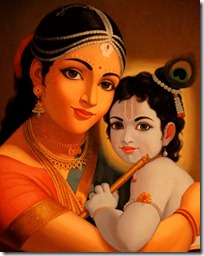 Devotion to God is a dynamic endeavor, devoid of monotony. It doesn’t have to be the same thing every day, and neither is it limited to one or two activities. Looking into Krishna’s mouth is equally as beneficial as praying before the deity or chanting the holy names, “Hare Krishna Hare Krishna, Krishna Krishna, Hare Hare, Hare Rama Hare Rama, Rama Rama, Hare Hare”.
Devotion to God is a dynamic endeavor, devoid of monotony. It doesn’t have to be the same thing every day, and neither is it limited to one or two activities. Looking into Krishna’s mouth is equally as beneficial as praying before the deity or chanting the holy names, “Hare Krishna Hare Krishna, Krishna Krishna, Hare Hare, Hare Rama Hare Rama, Rama Rama, Hare Hare”.
If you offer service to your community, family, or nation, you are limited in your ability to affect the outcome. For instance, if I have an issue of public importance that I am passionate about, I need to rally support for the cause in order to really make a difference. Politics follows this formula. In the private sector, if you don’t like a particular product, you no longer buy it. You move on to something else. You have some power as an individual, though the product manufacturers will still follow the trends set by the consumers as a group. In the public sector, however, you need the support of your fellow man in order to exercise the same individual choice. To influence votes, you need money, which automatically gives the wealthier lobbying groups an advantage.
In devotional service, all you need is sincerity. The offerings made in an authorized manner, following the instruction of a bona fide spiritual master, make their way directly to Krishna, who then adds His personal intervention to deliver the benefits. Krishna made sure to get accused of eating dirt to allow His mother to be mesmerized by the vision of the universal form. Of course, superior to that vision is the sweet, charming face of her young boy, who is the savior for the fallen souls.
In Closing:
As God, Krishna can do whatever He likes,
Through accusation set up a wonderful sight.
Naughty boy always with danger did flirt,
Now He would get in trouble for eating dirt.
Mother Yashoda, this accusation against son was told,
By Balarama and friends, eager for punishment to unfold.
This gave Yashoda a chance to be a parent good,
That child shouldn’t eat dirt must be understood.
Her son denied allegation with confidence,
Made her look into His mouth for evidence.
Son led devoted mother to a vision that inspired awe,
Universal form in Shri Krishna’s mouth she saw.

Monday, June 11, 2012
Chanting Om
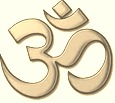 “The devotees directly fix their minds on the Person of the Absolute Truth. But one who is unable to accommodate such personal features of the Absolute is disciplined in impersonality to train the mind to make further progress.” (Shrila Prabhupada, Shrimad Bhagavatam, 2.1.17 Purport) “The devotees directly fix their minds on the Person of the Absolute Truth. But one who is unable to accommodate such personal features of the Absolute is disciplined in impersonality to train the mind to make further progress.” (Shrila Prabhupada, Shrimad Bhagavatam, 2.1.17 Purport)
So you’re having trouble accepting the fact that the Supreme Absolute Truth can be a personality with an exquisitely beautiful form. If it’s just too much to believe that the person the rest of the world refers to as God can have two hands that hold a flute, a peacock feather in His hair, and the most enchanting smile anyone has ever seen, the defiance is still no justification for rejecting spiritual life altogether. Rather, there are gradual steps available to accommodate any person along the train of purification of consciousness. The sacred syllable om is the trusted source for spiritual contact for one who has yet to taste the sweet nectar of Krishna’s association.
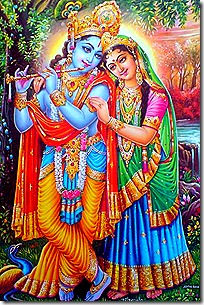 The taste can only come through contact within the proper mood. On my way to work I can see a pizza pie in a shop every day for years on end, but unless I actually buy a slice and eat the dish I won’t know how good it tastes. In a similar manner, giving a passing glance to Krishna, hearing His name without attention, or just reading about some of His activities without the requisite attitude will not elicit the proper emotional response within the recipient. So many personalities are purported to be God, so healthy skepticism in this regard is generally a good thing. After all, why would I want to believe what someone else tells me just on blind faith? I have a value to add to society with my ability to work, so why should I waste any effort doing something whose validity I’m not entirely confident of? The taste can only come through contact within the proper mood. On my way to work I can see a pizza pie in a shop every day for years on end, but unless I actually buy a slice and eat the dish I won’t know how good it tastes. In a similar manner, giving a passing glance to Krishna, hearing His name without attention, or just reading about some of His activities without the requisite attitude will not elicit the proper emotional response within the recipient. So many personalities are purported to be God, so healthy skepticism in this regard is generally a good thing. After all, why would I want to believe what someone else tells me just on blind faith? I have a value to add to society with my ability to work, so why should I waste any effort doing something whose validity I’m not entirely confident of?
If there is hesitancy with believing in Krishna’s divinity, there is still His impersonal feature which can be contemplated upon. In the state of ignorance there is also worship, but the object of attention is the external energy, which is known as maya. “That which is not” is the way to define the Supreme Lord’s illusory energy. You look in the mirror and check out your hair and assess whether or not you look good, but you’re not seeing who you really are. That picture in the mirror changes at every second, and over the course of many years those changes are easier to notice. Yet you are the same person today that you were when you emerged from the womb. In between that time there was no exit from your current form followed by a reentry.
The identifying aspect within you is known as the soul. That energy which you think represents you but really doesn’t is known as maya. In the basic scientific analysis, there is the understanding that all individual forces of life are spirit and not this illusory energy. But to understand these facts is difficult even when learning them from authorized sources. Therefore there are techniques that can be used to keep that realization within your mind, allowing you to act off of it.
After all, knowing such valuable pieces of information should influence the way you behave. If I do eat that slice of pizza that I’ve been seeing for so long, it may not be important to me what the ingredients are. What does it matter to me what goes into the dish if I’m only interested in tasting it? But knowledge of spirit and matter is helpful because it can positively influence behavior in all areas. Every kind of misery is due to ignorance of these laws of the spiritual science, and so when that ignorance is slashed away by the sword of knowledge, you can automatically find a pleasurable condition in situations that were previously only conducive to pain and heartache.
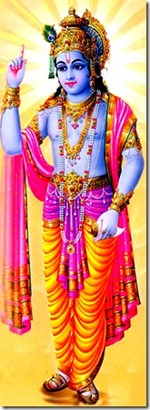 A primary source of distress is death, which has an accompanying negative force known as fear. Just as the ripened fruit has no other fear than to fall, the mature human being has no other worry than eventual death. Under the system of transcendental knowledge, the fear relating to the exit from the body is unfounded, as the vibrant spiritual force cannot be killed. This is the most difficult fact to realize and remember on an ongoing basis because once the soul does exit the body, we are no longer privy to its location. While it is within the moving form, we can tell that the spirit is present based on the autonomous functions of the living being. A primary source of distress is death, which has an accompanying negative force known as fear. Just as the ripened fruit has no other fear than to fall, the mature human being has no other worry than eventual death. Under the system of transcendental knowledge, the fear relating to the exit from the body is unfounded, as the vibrant spiritual force cannot be killed. This is the most difficult fact to realize and remember on an ongoing basis because once the soul does exit the body, we are no longer privy to its location. While it is within the moving form, we can tell that the spirit is present based on the autonomous functions of the living being.
One way to understand these higher truths and use them to your benefit is to chant the sacred syllable om.Om is the sound vibration representation of the Absolute Truth. Know that spirit is not affected by duality. Spirit is neither up nor down; neither hot nor cold. Spirit is pure truth; it is unchanging. Since every living being is spirit, there is an aggregate total which is called Brahman in the Vedas, the ancient scriptures of India. Om directly addresses Brahman, and through chanting that sound one can hopefully remain aware of their true nature as spirit.
Accompanying the chanting of om are several important restrictions. The aim is to understand that you are spirit and not matter, so obviously you have to get rid of the prior behavior that was based off your misunderstanding. If you used to drink heavily to become intoxicated to escape the influence of the senses, you will no longer do that if you know that drinking is bad for you. That is just one type of behavior based on illusion, the association with the body, so we can imagine just how many other activities there are that further strengthen the bond to the temporary form and its relationships.
So within the routine of connecting with Brahman, there are restrictions on the most sinful behaviors. This guiding principle is known as vairagya, or renunciation. If there is a serious desire to chant om and understand the Absolute Truth, then the more renunciation the better. The more distractions you can take away , the better chance you will have for staying Brahman realized.
This path of spiritual life is considered very difficult due to the present circumstances in society. Dharma is the occupational duty of the living entity that helps keep them Brahman realized, but in the current age of quarrel and hypocrisy there is so much cheating that dharma is difficult to decipher. Rather than accept the true principles of religion from the beginning of life, there is constant competition between factions who each essentially make up their own meaning to life and how to fulfill it.
 The path of personal worship is superior in both ease of implementation and end reward. Brahman has a source, as it is just the spiritual light beaming off of the incredibly effulgent Supreme Personality of Godhead. He is the cherished end for the truly wise, who are able to accept that a person is behind these intricate concepts such as Brahman and maya. Though it may be difficult to accept His existence due to the defiant attitude solidified through many births in a temporary land, the association in the proper mood is what reveals the truth to His existence. The practice of the principles of spiritual life aimed at understanding Brahman can get one properly situated to understand and relish the Supreme Lord’s personal features. The path of personal worship is superior in both ease of implementation and end reward. Brahman has a source, as it is just the spiritual light beaming off of the incredibly effulgent Supreme Personality of Godhead. He is the cherished end for the truly wise, who are able to accept that a person is behind these intricate concepts such as Brahman and maya. Though it may be difficult to accept His existence due to the defiant attitude solidified through many births in a temporary land, the association in the proper mood is what reveals the truth to His existence. The practice of the principles of spiritual life aimed at understanding Brahman can get one properly situated to understand and relish the Supreme Lord’s personal features.
And who isn’t attracted by attractiveness? Krishna is the most beautiful, and this beauty is present in all aspects that directly represent Him. His name is one of these non-different aspects, so just bychanting, “Hare Krishna Hare Krishna, Krishna Krishna, Hare Hare, Hare Rama Hare Rama, Rama Rama, Hare Hare”, you can get the same benefit of chanting om and much more. The personality traits, features and pastimes accompany the name of Krishna, and with those additional aspects you get many more items of contemplation. You can also offer service to a personality, whereas with an impersonal force all you can do is meditate.
The service to Krishna comes in the form of chanting His names, visiting places of relevance to Him, reading books about Him, and associating with others who are devoted to Him. The entire collection of available activities is known as bhakti-yoga, or devotional service. It is the easiest discipline to implement but the most difficult to accept with conviction. The humble attitude in surrender is required to feel the bliss of Krishna’s association, and the more that attitude strengthens, the more pleasure there is for the devotee. The impersonal force of Brahman is simultaneously understood by Krishna’s servant, who learns to not only see Brahman everywhere but to also appreciate its influence and how the illusory energy of maya can play such wonderful tricks. Om itself is a wonderful benediction, as it allows any person to make progress along the proper spiritual path, irrespective of their initial inclination.
In Closing:
On worshiping personal form you’re not keen,
As never to you has a blue god with flute been seen.
Though not ideal, this obstinacy can still be okay,
For to understand God there are many different ways.
With firm faith the sacred syllable om you can say,
Thus understand impersonal Brahman you may.
But know that this path has many a restriction,
To know Brahman and worship matter a contradiction.
On the other hand, if you follow bhakti’s course,
You can know Krishna, Brahman’s original source.
Process of chanting om from Him has come,
Thus in benevolence He is number one.
In the proper mood chant Krishna’s names instead,
The soul with much needed spiritual nectar to be fed.
 |
Wednesday, June 6, 2012
Real Self-Interest
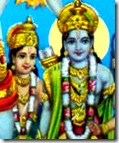 “I had turned my mind away from sense gratification and instead did service for meeting spiritual interests. But now seeing them [Rama and Lakshmana] I knowingly want to seek out selfish interests.” (Janaki Mangala, 45) “I had turned my mind away from sense gratification and instead did service for meeting spiritual interests. But now seeing them [Rama and Lakshmana] I knowingly want to seek out selfish interests.” (Janaki Mangala, 45)
biṣaya bimukha mana mora sei paramāratha |
inhahiṃ dekhi bhayo magana jāni baḍa svāratha ||
In the Shrimad Bhagavatam, the crown-jewel of Vedic literature, there is a statement by Prahlada Maharaja relating to the self-interest of every human being. Artha refers to profit or interest, and it can be of two kinds. First there are the selfish desires, those things we want for our body as it is currently constituted. Then there are the spiritual interests, desires to be met in the afterlife, after we have exited our current body. Though typically a distinction is made between the two types of interest, Prahlada kindly notes that one’s self-interest can actually be met by going towards Vishnu, the Supreme Lord. In that endeavor there is no question of a difference between the interests of the self in the present world and the assets accumulated for the afterlife.
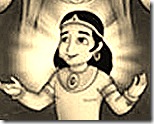 A distinction is only seen because there is a supposed difference in behavior guided by the particular state of mind. With focus on svartha, or self-interest, there is so much work to be done. If my selfish interest is to be wealthy, I will purchase some land and try to either flip it for a higher price or have tenants to pay the monthly bills. Another pathway towards wealth is owning your own business, providing a good or service to society for a fee that enables you to earn a profit. These interests are selfish, as they only relate to the present body, which is destined for destruction. A distinction is only seen because there is a supposed difference in behavior guided by the particular state of mind. With focus on svartha, or self-interest, there is so much work to be done. If my selfish interest is to be wealthy, I will purchase some land and try to either flip it for a higher price or have tenants to pay the monthly bills. Another pathway towards wealth is owning your own business, providing a good or service to society for a fee that enables you to earn a profit. These interests are selfish, as they only relate to the present body, which is destined for destruction.
To use another example, let’s say that you are in your senior year of college. You know that you will be graduating and moving on to the real world of working at the end of the year, so your focus isn’t so much on school anymore. The real self-interest is in preparing yourself for graduation and then working after that, but you instead foolishly concentrate only on the right now, the present. Because of this you take your self-interest to be partying and drinking with your friends, night after night. In the short term you will feel pleasure, but the behavior isn’t wise because your identity as a graduating college student will expire very shortly. Once that identity leaves, the partying you did previously will not help you going forward.
Svartha as a whole suffers from the same defect, namely the changing of identity. Therefore the Vedas put emphasis on paramartha, or supreme profit. These are the interests relating to the afterlife, where one heads after the present life completes. To acquire unselfish, spiritual merits one has to turn their back on the things presently constituting svartha. Eating, sleeping, mating and defending are activities of the animals that the human being follows as well. Nevertheless, they do not meet the higher interests of the living entity, so with proper instruction one can learn to indulge in them as little as possible.
In this way paramartha generally equates to renunciation. Give up those things which don’t relate to your true identity as a spirit soul, who is beyond the temporary manifestations of matter. To meet paramartha, follow the Vedic rituals and regulations, live by austerity, don’t get too attached to anything of the phenomenal world, and then be Brahman realized. Brahman is the Absolute Truth. It is pure spirit, a giant collection of energy of which we are part. Every living entity is a spark of Brahman, so they are eternal, blissful and knowledgeable by constitution, though the current collection of material elements inhibits that position from rising to a fully active state.
 Though he was the ruler of Mithila, King Janaka was solely focused on paramartha. He had renounced the pursuit for selfish interests in favor of abiding by dharma. He was an adept yogi, capable of withdrawing the mind from the objects of the senses. Even though he was renounced and focused on paramartha, he still exhibited model behavior by taking care of his occupational duties. He managed his kingdom very well, and when his eldest daughter reached the proper age, he arranged for her marriage. Though he was the ruler of Mithila, King Janaka was solely focused on paramartha. He had renounced the pursuit for selfish interests in favor of abiding by dharma. He was an adept yogi, capable of withdrawing the mind from the objects of the senses. Even though he was renounced and focused on paramartha, he still exhibited model behavior by taking care of his occupational duties. He managed his kingdom very well, and when his eldest daughter reached the proper age, he arranged for her marriage.
In the kshatriya community, it is quite common for marriages to be determined by a show of dexterity or bravery. Lord Krishna, the Supreme Personality of Godhead, married over sixteen thousand wives during His time on earth, and almost every one of them were won through a contest or a kidnap-style arrangement. A warrior must fight, just as a general must have a mission to lead. If these opportunities for action are absent, the titles don’t mean anything. The kings of the past would welcome any opportunity to show their fighting prowess. From the father’s side, if he could see a young man showing off his strength in battle, he would take it as a sign that his daughter would be protected by him.
Janaka held a contest for lifting an extremely heavy bow. The winner would show that they were the strongest man in the world. They would prove their ability to protect Sita Devi, the beloved daughter of the king. Though he was renounced from the world, Janaka still held high affection for his beloved daughter, whom he had found one day while ploughing a field. She was a baby at the time, and Janaka took her in and raised her as his daughter. Now it was time to give her away.
We got a hint of the true meaning of svartha when Janaka held affection for Sita upon seeing her for the first time, and in the above referenced verse from the Janaki Mangala, we are again reminded of that meaning. Lord Rama and His younger brother Lakshmana came to Janaka’s city to witness the festivities. They were accompanying the exalted Vishvamitra Muni through the forests. When Janaka saw the two brothers, he couldn’t believe how beautiful they were. “Who are their parents? They must be an ocean of purity. These boys are unbelievably beautiful and I can’t stop looking at them.”
In the above referenced verse, which is both insightful and humorous, Janaka remarks on how he had previously given up sense gratification in favor of chasing paramartha, but now he was only interested in seeking selfish-interest to a large degree by looking at these youths. Yet from the instruction of Prahlada Maharaja, we see that Janaka was actually not breaking from his previous position. Because Shri Rama is Vishnu Himself and Lakshmana the Lord’s eternal servant, harboring affection for them does fulfill paramartha. Since they appeared in a world where the general pursuit is for selfish interests, Janaka thought that appreciating their beauty and wanting to soak in the visual nectar over and over again was a selfish desire.
 In the arena of bhakti, becoming selfish actually equates to happiness both in the present and future. The self-interest of the living entity is met by immersing oneself in the transcendental qualities of the Supreme Lord. One can hear about these qualities, chant mantras describing them, or witness them personally as Janaka did. Suddenly, the great king’s renunciation went out the window. No more strict austerity, penance, and sacrifice for worrying about merits that may or may not arrive in the afterlife. His focused shifted to the here and now, looking at God and His younger brother while they were in front of him. In the arena of bhakti, becoming selfish actually equates to happiness both in the present and future. The self-interest of the living entity is met by immersing oneself in the transcendental qualities of the Supreme Lord. One can hear about these qualities, chant mantras describing them, or witness them personally as Janaka did. Suddenly, the great king’s renunciation went out the window. No more strict austerity, penance, and sacrifice for worrying about merits that may or may not arrive in the afterlife. His focused shifted to the here and now, looking at God and His younger brother while they were in front of him.
Should one be interested only in paramartha, the steps they take to secure it nevertheless purifies them and makes them eligible for witnessing the same beauty that Janaka saw. But with worship of Vishnu you don’t have to wait until the afterlife to enjoy the benefits. The spirit soul is constitutionally situated to be a lover of God, so that love can be released at any moment and at any stage in life. Both selfish and unselfish merits exhaust after a certain period of time, but harboring a loving attachment for God only brings more opportunities for service in the future.
Seeing Rama and Lakshmana, Janaka developed a strong affection for them, and though he thought he had fallen back into the world of material association, he actually started his real service to God. His dispassion made him pure and his attention to dharma made him respected and worthy of spiritual merits, but it was his love for Sita that brought Rama and Lakshmana to his kingdom. It would be his love for the Supreme Lord that would make him famous throughout history, as he is still celebrated and honored to this day for his devotion.
In Closing:
Prahlada Maharaja says man does not know,
That his real self-interest is to Vishnu’s realm to go.
Svartha for sense gratification to acquire,
Paramartha for spiritual realm to aspire.
But in bhakti-yoga no such distinction,
For devotional service is desired condition.
With worldly life King Janaka thought he was done,
But changed when seeing visitors who had come.
Rama and Lakshmana, of beauty one couldn’t believe.
From attachment to them real self-interest receive.
 |
Tuesday, May 29, 2012
Who You Represent
 “Like an ocean of purity are the mother and father of these children, who are like a heavenly desire tree, who have a spotless beauty that gives the eyes so much happiness that is without end.” (Janaki Mangala, 43) “Like an ocean of purity are the mother and father of these children, who are like a heavenly desire tree, who have a spotless beauty that gives the eyes so much happiness that is without end.” (Janaki Mangala, 43)
punya payodhi mātu pitu e sisu suratarū |
rūpa sudhā sukha deta nayana amarani barū ||
Like it or not, your behavior is a reflection on your upbringing. The people who raise you are responsible for making sure that when you’re an adult you follow the proper standards of conduct, that you obey the law and don’t cause a nuisance to society. A parent especially understands how difficult it is to raise a child and make sure that they grow up to be properly educated and well-behaved, so when they see good traits in another child they immediately think of the role of the parents. This was the case with a famous king who cast his glance upon the transcendental form of the Supreme Personality of Godhead, Lord Rama.
What is a transcendental form? Can God have any other kind of form? God is everything, a fact which isn’t too earthshattering. In mathematics there is the concept of sets and what different values they can contain. The most inclusive set is that which has the most values, the largest amount of numbers that represent the possible aggregations one can find. If we looked at the entire creation from a mathematical perspective, we’d see that there is a sum collection of space and its component objects. Obviously the measurement of that collection is unfathomable, but there is nevertheless a total amount. If we see a jar full of jellybeans, we can’t be exactly sure to the number how many jellybeans there are, but there is still a specific total.
 If we calculated a total for the universe, it’d be a representation of God. His universal form, orvirat-rupa, is one way to think of Him, but at the same time this only represents a partial view. “How is this possible? If we include everything, is that not the limit to existence? The Absolute Truth is the entire collection of gross matter, or a form that is considered invisible to the mind. We can’t see the universal form but we know that it exists. Therefore God is not a perceived reality. He must be accepted as an impersonal force that is always present in some way.” If we calculated a total for the universe, it’d be a representation of God. His universal form, orvirat-rupa, is one way to think of Him, but at the same time this only represents a partial view. “How is this possible? If we include everything, is that not the limit to existence? The Absolute Truth is the entire collection of gross matter, or a form that is considered invisible to the mind. We can’t see the universal form but we know that it exists. Therefore God is not a perceived reality. He must be accepted as an impersonal force that is always present in some way.”
But the Vedas, the ancient scriptures of India, reveal that the Supreme Lord is both formless and with form. The distinction itself is a necessary product of illusion, pointing to a limitation in understanding. Just as we say that the sun is not out on a particular day because of the influence of the clouds, since we can’t understand what a spiritual form is, we say that the macrocosmic vision of the Lord is His only feature. But to show what it means to have a transcendental form, that Absolute Truth kindly appears before our eyes every now and then. The foolish still don’t understand His true nature even when looking directly at Him, but for those who are humble enough to know their limitations and accept the statements of the bona fide acharyas on faith in the beginning, the fruit of existence is revealed.
Shri Rama, the young boy who accompanied Vishvamitra Muni through the forests many thousands of years ago, showed the pious exactly what God looks like. The Lord has many spiritual forms and the fact that they appear within this material world is not extraordinary. A person who is superior and in charge of a particular energy can never be beholden to that energy’s influence. The material nature, which spreads illusion that results in an identification with dull matter, has no existence on its own. Rather, it is consciousness that brings the presence of life, and the source of that consciousness is God.
In every vibrant life form, including our own body, the consciousness derived from the Supreme Lord’s superconsciousness is present. We can think, feel and will because we are similar in quality to God but vastly inferior to Him in quantitative powers. We can be illusioned, but He cannot. With proper training in the system of spirituality descending from Shri Rama, illusion can dissipate, paving the way towards basking in the sweetness of God’s transcendental form.
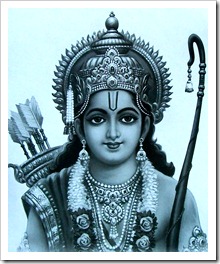 Even the exalted figures are sometimes bewildered by this apparent duality, the fact that God is everything and still capable of appearing within a smaller section. Mother Parvati once asked her dear husband Lord Shiva to describe the glories of Shri Rama and explain how Rama is actually God and not an ordinary man. Lord Shiva began his discourse by remarking that there is no difference between the personal and the impersonal features of the Supreme Personality of Godhead. There is only a perceived difference, and due to that one tends to think that Rama accepts a material form and then rejects it. The Supreme Lord is never subject to illusion nor is He ever away from us. He pervades all of space and at the same time He is not personally present within everything. His divine vision is granted to the kind souls who know how to properly utilize His energies. Even the exalted figures are sometimes bewildered by this apparent duality, the fact that God is everything and still capable of appearing within a smaller section. Mother Parvati once asked her dear husband Lord Shiva to describe the glories of Shri Rama and explain how Rama is actually God and not an ordinary man. Lord Shiva began his discourse by remarking that there is no difference between the personal and the impersonal features of the Supreme Personality of Godhead. There is only a perceived difference, and due to that one tends to think that Rama accepts a material form and then rejects it. The Supreme Lord is never subject to illusion nor is He ever away from us. He pervades all of space and at the same time He is not personally present within everything. His divine vision is granted to the kind souls who know how to properly utilize His energies.
When King Janaka saw Rama and Lakshmana entering his kingdom, he was enamored by their beauty. Vishvamitra brought the brothers to Janakpur to witness the bow-lifting contest that was taking place. Up to this point, Janaka was intimately familiar with Brahman, which is a theoretical understanding of spirit but one that is still not complete. To know Brahman is to know that spirit is the essence of identity and that it is transcendental to matter. Knowing Bhagavan, however, is knowing that Brahman has an origin.
Rama is Bhagavan, the Supreme Personality of Godhead appearing before the eyes of the earth’s creatures in the guise of a warrior prince. In Bhagavan’s original feature, He is Shri Krishna, the charming youth with a blackish complexion holding a flute in His hands and enchanting the residents of the spiritual planet of Goloka Vrindavana. The personal expansions of Krishna are identical to Him in potency. The only difference is in the transcendental mood of devotion that they instill in their followers. Rama was especially attractive to Janaka upon first sight. The king couldn’t believe what he was feeling, a sort of ecstasy that he did not think was possible. By understanding Brahman one learns to keep their emotions in check, to not be distracted by temporary highs and lows. Indeed, Janaka was holding this contest only to follow dharma. Personally he did not wish to part with his beloved daughter Sita, but dharma called for the king to marry off his daughter when she reached an appropriate age.
 When Janaka, a good parent in his own right, saw Rama and Lakshmana, he immediately thought of their parents. He thought that the parents must be an ocean of purity, for the boys were like a wish-fulfilling tree whose beautiful forms granted so much unending happiness to the eyes. The children are produced by the parents, and in the Vedic culture one follows so many rules and regulations to ensure that their offspring are beautiful and virtuous. Rama was the most beautiful and Lakshmana was like His twin, so whoever produced them must have had the largest store of virtue. When Janaka, a good parent in his own right, saw Rama and Lakshmana, he immediately thought of their parents. He thought that the parents must be an ocean of purity, for the boys were like a wish-fulfilling tree whose beautiful forms granted so much unending happiness to the eyes. The children are produced by the parents, and in the Vedic culture one follows so many rules and regulations to ensure that their offspring are beautiful and virtuous. Rama was the most beautiful and Lakshmana was like His twin, so whoever produced them must have had the largest store of virtue.
Rama would uphold the good name and fame of His parents by His outward beauty and by His actions. As God, Rama does not have any parents, but to give pleasure in the mood of bhakti known as vatsalya-rasa He appears from the womb of mother Kausalya during every Treta Yuga, or second time period of creation. He accepts King Dasharatha as a father to give the pious leader an heir to the throne of Ayodhya. Dasharatha also develops a firm attachment to Rama, who becomes the king’s life and soul.
Rama would give so much fame to His family line by winning the contest, being the only man capable of lifting Shiva’s bow. It was almost as if Lord Shiva had coordinated the events, for he delights in hearing about Rama and discussing His pastimes with others. Goswami Tulsidas, the author of the Janaki Mangala, follows Mahadeva’s example by giving the world delightful poetry to be used in remembering Sita, Rama, Lakshmana and the Lord’s most faithful servant Hanuman.
King Janaka was very sweet in his observations on Rama and Lakshmana and their family, and the same sentiments could be applied to him. How pious the parents of Janaka must have been to get a son who would take care of the goddess of fortune, Sita Devi, and then invite Shri Rama Himself to the kingdom. Tulsidas sparks the same question in the reader. Where did Rama find someone so kind to describe His pastimes? Where does Rama find a dedicated brother like Lakshmana and a heroic servant like Hanuman? These questions are difficult to answer even for the Lord, for He is so pleased by the service of the devotees.
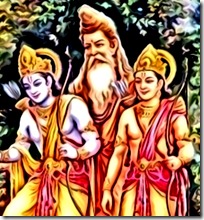 From this incident with Janaka we get a good idea on how to serve our parents, who do so much to protect us in life. The parents have a difficult job because they cannot slip in their behavior. The impressionable young child will follow the behavior of the parents more than their words. If we do acquire any good qualities, if we are fortunate enough to chant the holy names of the Lord, “Hare Krishna Hare Krishna, Krishna Krishna, Hare Hare, Hare Rama Hare Rama, Rama Rama, Hare Hare”, it should be understood that our parents did a good job in raising us, even if it may seem otherwise. Somehow or other we were put into the position to connect with the holy name, which fully represents the Supreme Lord and His personal self. From this incident with Janaka we get a good idea on how to serve our parents, who do so much to protect us in life. The parents have a difficult job because they cannot slip in their behavior. The impressionable young child will follow the behavior of the parents more than their words. If we do acquire any good qualities, if we are fortunate enough to chant the holy names of the Lord, “Hare Krishna Hare Krishna, Krishna Krishna, Hare Hare, Hare Rama Hare Rama, Rama Rama, Hare Hare”, it should be understood that our parents did a good job in raising us, even if it may seem otherwise. Somehow or other we were put into the position to connect with the holy name, which fully represents the Supreme Lord and His personal self.
To repay the service offered by the parents, one should follow the highest system of piety, which is known as bhagavata-dharma, or devotional service. Rama upheld the virtue of His parents and ancestors by following the prescribed duties of His order, the kshatriya. The kshatriyas are royal administrators, so they must exhibit bravery in combat and impartiality in the distribution of justice. In the current age of quarrel and hypocrisy, the lines have been blurred to the point that one can’t figure out what their occupational duties are. Thus there is only one dharma that need be followed: devotion to God. From regularly chanting God’s names, hearing about His pastimes and worshiping and honoring His servants, we give the highest service to our parents. We represent them in our behavior, so if we can show that life’s mission of understanding God is reached, we prove that they are full of purity as well, for they gave the world a sincere servant of the Lord, whose association is a terrific boon.
In Closing:
Know that responsibility with everything you do,
Represent your character and your parents’ too.
Thus if you point your behavior in right direction,
On the merits of mother and father a good reflection.
Seeing Rama and Lakshmana, of their origin Janaka unsure,
But could guess that their parents were like an ocean pure.
Endless happiness to eyes that their forms see,
Thus boys appeared as if they were heavenly desire tree.
When your consciousness to divine realm you send,
The pious credits to your good parents will extend.
|
Subscribe to:
Posts (Atom)